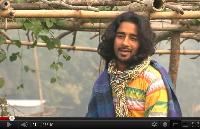Bangladesch: Amra Ki Etoi Bhinno – Are we so different bester Dokumentarfilm am 3rd Kashish Queer Film Festival 2012 in Mumbai
aktuell 01.09.2013 Calls for Decriminalizing Same-Sex Relations
 Amra Ki Etoi Bhinno – Are we so different
Amra Ki Etoi Bhinno – Are we so different
Der wunderschöne Film zeigt das schwierige Überleben und Einordnen in eine von maskulinen und patriarchalischen Idealen dominierte Gesellschaft. Wie, mit welchen Schwierigkeiten und welchem Erfolg diese Ideale und Strukturen herausgefordert wurden, erzählen die Protagonisten in ihren eigenen Worten. 36 wirklich sehenswerte Minuten.
In ganzer Länge: Amra Ki Etoi Bhinno – Are we so different (36 min).
Webseite: 3rd Kashish Queer Film Festival, Mumbai, Mai 2012 (Englisch).
Nachtrag, Juli 2012: Der Transfilm Common Gender von Noman Robin, zeigt lyrisch die unmögliche Liebergeschichte zwischen der Hijra (Transfrau) Sushmita und einem jungen Hindu, dessen Eltern die Beziehung nicht akzeptieren, was zu einem traurigen Ende führt. Der Film wird in Dhaka, der Hauptstadt Bangladesch gleichzeitig in sechs Kinos gezeigt und macht offenbar auch in de Medien furore.
Trans movie is surprise hit in Bangladesh (Englisch, und Trailer, und FB-Seite Noman Robin)
Film Common Gender von Noman Robin in ganzer Länge (Youtube, 51:45)
Amnesty International: Länderbericht Bangladesch 2012 (Deutsch)
Vergleiche zu Indien:
Inferno zum Transgender Day of Remembrance – mindestens 15 Hijras verbrannt (Nov 2011)
Homophobe Bemerkung des Gesundheitsministers Ghulam Nabi Azad (Juli 2011)
Indien: Ein Jahr Delhi Urteil – Homosexuelle sind freier geworden – Stigma bleibt (Juli 2010)
Vor zwei Jahren erklärte das Oberste Gericht von Neu-Delhi das britisches Kolonialgesetz gegen Homosexualität von 1861 als teilweise ungültig (Juli 2009).
Vergleiche zu Hijras, mit vielen Links:
Hijras in Varanasi, Ausstellung im Café Zähringer Mai/Juni 2009
sowie: NZZ: Indien und Pakistan erkennen juristisch ein «drittes Geschlecht» an
und: Renate Syed: Weibliche Seele, männlicher Leib (Dez 2011).
Weitere Filme.
Indonesien: Acht Selbstporträts lesbischer und transidenter Frauen – Dokumentarfilm und Diskussion (Mai 2012)
Pinkapple Filmfestival: «Camminando verso» von Roberto Cuzzillo (mai 2012
Uganda: ‘Call Me Kuchu’ gewinnt Sonderpreis an der Berlinale – Ugandas LGBT im Kampf für Gleichberechtigung (Feb 2012)
Pinkpanorama Luzern: All My Life – Film von Maher Sabry – schwule Liebe in Ägypten (Nov2011)
< ! ----------------------------------------------------------------------------------->
Medienmitteilung
Filmtext (Englisch)
< ! ----------------------------------------------------------------------------------->
The FULL MOVIE (36 Minutes) of „Amra Ki Etoi Bhinno“ (Best short Doumentary 2012 @ Kashish Mumbai Queer Film Fest)
‚Amra Ki Etoi Bhinno… Are we so different‘ is a documentary film on Bangladeshi Hijra, Gay and Bisexual community. It was awarded the ‚The Best Documentary Short Film 2012‘ at „Kashish 2012– 3rd Mumbai International Queer Film Festival“, India’s (and South Asia’s) biggest Queer Film Festival. Kashish 2012 was held from May 23 to May 27, 2012 in Mumbai, India, and featured 120 films from 30 countries.
The film talks about a range of masculinities and its impact on people’s lives, and about how different people have unique experiences of coping and surviving in Bangladesh, often ruled by strict masculinist and patriarchist ideals. The stories of those who challenge these strictures and notions are told in this film in their own words.
Internationally acclaimed film critic and writer Mayank Shekhar, spoke on behalf of the jury at Kashish 2012 and had this to say about the film: „It’s a phenomenal sensitive document on Hijra and Bisexual/Gay community of Bangladesh. This film speaks from the heart and reveals stories of sheer courage and deep hurt. It’s a bold account on men and trangenders fighting for space in a completely patriarchic world. It is as true for India as for rural and urban Bangladesh and so many cultures where we forget to celebrate the differences between us that make us all so special in our own ways. The characters in the film bare their souls in front of the camera, and what is left is a film that is as unique as its characters. It’s a phenomenal film!“
Receiving the award on behalf of the film, its Director, Lok Prakash said „about 20 years back there were major political developments which led to greater acceptance of alternate sexuality in Europe and America, which later impacted many countries, including India. Now we in India must also think beyond decriminalization of section 377 in India. People in India should not forget about their neighbours in Bangladesh and Sri Lanka. Countries in South Asia must also concentrate much more on social acceptance of LGBT people because they all are part of the same culture. “
This film is produced by Bandhu Social welfare Society, Bangladesh in collaboration with TEG Mediatech Pvt. Ltd. To see pictures and other details of the film you may check out facebook: http://www.facebook.com/tegproduction. < ! and for publishing if you need higher resolution photograph please write to anu_at_efficientgroup.net >

